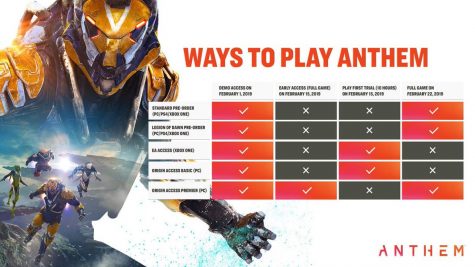Anthem’s troubled development
 When Bioware’s Anthem was announced at E3 in 2017, it was marked by confusion. In fact, merely days before it was announced, it was called Beyond, but then copyright issues prevented it from being called that. At the E3 release, people had no idea what it was. BioWare, a company known for story-driven and choice-heavy games that required extensive user interaction like the Dragon Age and Mass Effect series, were seemingly making a game about shooting monsters and buying cool weapons with a vague story. While the environments and models looked great, it all felt a bit bland and drew unfavorable comparisons to the similarly generic Destiny. However, what eventually came out in the end was even worse than Destiny.
When Bioware’s Anthem was announced at E3 in 2017, it was marked by confusion. In fact, merely days before it was announced, it was called Beyond, but then copyright issues prevented it from being called that. At the E3 release, people had no idea what it was. BioWare, a company known for story-driven and choice-heavy games that required extensive user interaction like the Dragon Age and Mass Effect series, were seemingly making a game about shooting monsters and buying cool weapons with a vague story. While the environments and models looked great, it all felt a bit bland and drew unfavorable comparisons to the similarly generic Destiny. However, what eventually came out in the end was even worse than Destiny.
While video game developers have faced unfair criticism for growing industry trends of cash-grabbing functions such as pre-order bonuses and season passes and games coming out unfinished, Anthem managed to exemplify everything listed above. There were 5 versions of the game! There was a standard pre-order edition, which came with VIP access and a legendary armor set. Then, there was the $80 Legion of Dawn pre-order edition, which came with 4 whole legendary skins, a legendary weapon, a banner, and a digital download of the game soundtrack. Then, there were also the Xbox and PC-exclusive EA Origin Access editions, with the privilege of playing a 10 hour free trial a week before the game came out for the basic edition, and accessing the game a whole week early for the premium edition. They had to make a whole chart just to explain the different privileges associated with the different editions.

This blatant cash-grabbing by BioWare and EA might have been excused if the game they used it for was good, or even finished. But the optimism that was left for it went away completely when it came out. Even dating back to the early access demo, customers complained about buggy loading screens, assets that wouldn’t load, and even games and servers crashing in the middle of gameplay. These issues multiplied tenfold with the official release of the game, with even more coming out as soon as release day.
Most of them were mildly annoying, such as improper loot distribution, and insufficient damage counters and graphical glitches, so BioWare did what any studio would do and released a day-one patch. After that, the floodgates opened. Reports of PS4 users experiencing total system shutdown started emerging. Not the game shutting down, the whole console. Bad press about the game started coming out, criticizing its predatory microtransactions, bevy of issues, and unhelpful tech support team. After the dust settled, the damage was done.
Anthem was given a 55 by metacritic after compiling dozens of reviews and stands as an example of what not to do for a video game release. An analysis by Kotaku compiled interviews from anonymous BioWare employees, exposing the game’s development process as chaotic, heavily influenced by publisher EA, and a process that resulted in many developers putting in hours of unpaid overtime for an unfinished product. As of now, many of its problems and gameplay inconsistencies have been fixed by the development team, but its reputation and missteps will never be forgotten.

I am a junior in Oakton high school. This is my third year being a staff writer for the Oakton Outlook and I mostly like writing about culture, politics,...





